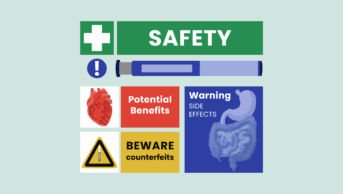
Shutterstock.com
The Medicines and Healthcare products Regulatory Agency (MHRA) is reviewing available evidence on potentially serious side effects linked to medicines containing pseudoephedrine.
This follows an announcement from the European Medicines Agency (EMA), on 10 February 2023, that it had started a review of medicines containing pseudoephedrine, following concerns over the risk of two conditions affecting blood vessels in the brain; posterior reversible encephalopathy syndrome (PRES) and reversible cerebral vasoconstriction syndrome (RCVS), after a small number of cases were reported in people taking pseudoephedrine-containing medicines.
PRES and RCVS can involve reduced blood supply to the brain and may cause major and life-threatening complications; common symptoms include headache, nausea and seizures.
Pseudoephedrine-containing medicines, which are taken orally, are used to treat nasal congestion resulting from a cold, flu or allergy and work by stimulating nerve endings to release noradrenaline, which causes the blood vessels to constrict.
The medicines have a known risk of cardiovascular and cerebrovascular ischaemic events, including stroke and heart attack, and restrictions and warnings are already included in the medicines’ product information.
However, because of the seriousness of PRES and RCVS, overall safety profile of pseudoephedrine and indications for which the medicines are approved, the EMA’s pharmacovigilance risk assessment committee will review available evidence and decide whether the marketing authorisations for pseudoephedrine-containing medicines should be maintained, varied, suspended or withdrawn across the EU.
Speaking to The Pharmaceutical Journal following the EMA’s announcement, a spokesperson for the MHRA said that it too was “reviewing the available evidence”.
“We keep the safety of all medicines under close review to ensure that the benefits outweigh any risks — the safety of the public is our top priority,” they said.
“We are reviewing the available evidence regarding the use of medicines containing pseudoephedrine and the risk of posterior reversible encephalopathy syndrome and reversible cerebral vasoconstriction syndrome, which have been very rarely reported with these medicines. We will provide any further advice as appropriate.
“We would also like to remind patients and parents/carers to report any suspected side effects to our Yellow Card scheme.”
A very small number of unique UK Yellow Card reports of these events have been received for pseudoephedrine products; one of PRES where the patient recovered and one for RCVS where the outcome was unknown.
A spokesperson for the Royal Pharmaceutical Society said that pharmacists were “well aware” of the risks of misuse of pseudoephedrine and “manage those effectively”.
“When new risks come to light it’s right that they are investigated by the appropriate authorities and we await the outcome of the EMA and MHRA reviews,” they said.


